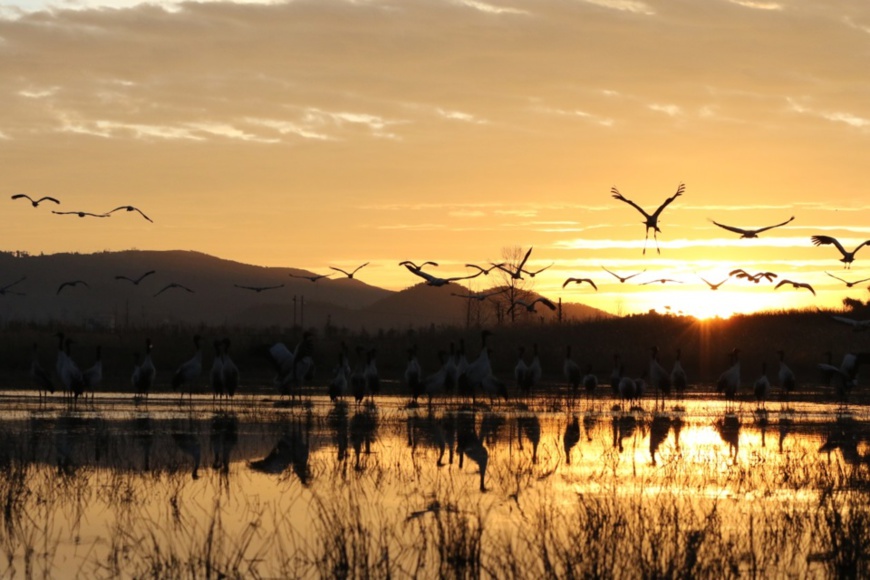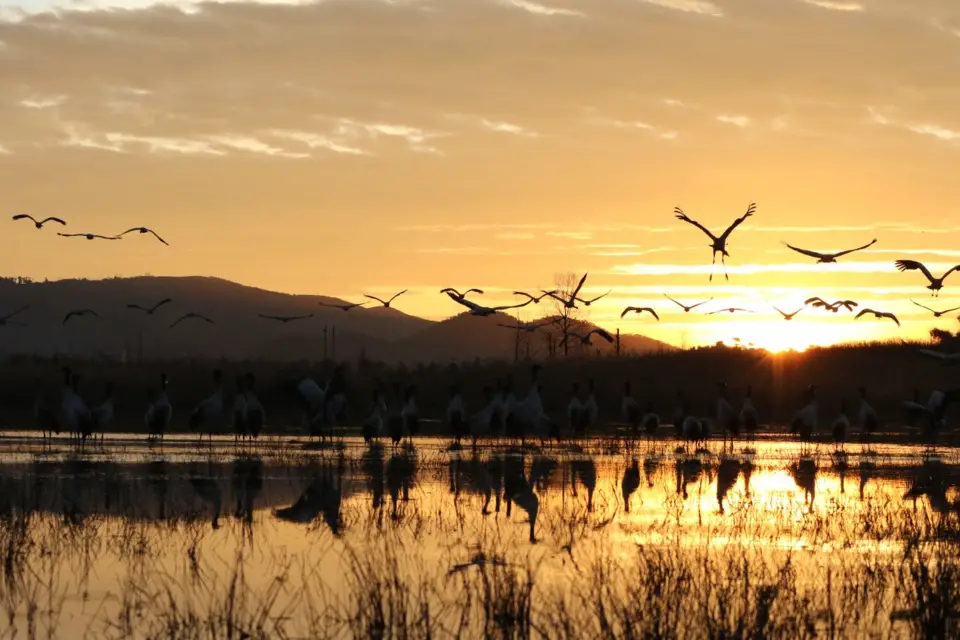By Su Bin, People’s Daily

Photo shows black-necked cranes hovering over a lake in Caohai National Nature Reserve located in Yi, Hui and Miao autonomous county of Weining, southwest China's Guizhou province. (Photo by Liu Guanghui/People’s Daily)
The Caohai National Nature Reserve in southwest China’s Guizhou province, a major winter base for migratory birds, is seeing improving ecology thanks to the efforts of a group of bird rangers.
Wang Mingyue, head of a patrol team that observes and protects birds in the wetland nature reserve located in the Yi, Hui and Miao autonomous county of Weining, Guizhou province, finds great pleasure in his work, though he and his fellow team members need to wake up very early in the morning and stay up late at night for work.
Besides patrolling around the nature reserve, bird rangers must learn to identify bird species and figure out their habits, according to Wang, who said that every time he spots strange birds, he takes photos of them and then asks experienced bird rangers later about the species they belong to. The man can now identify over 30 species of birds.
The bird rangers group in the nature reserve has evolved from a small team with less than 10 members to a large group with 60 members in seven teams, who are assigned to patrol different districts of the nature reserve. The significant increase in manpower has eased the pressure on each bird rangers.
Every day before daybreak, Wang and his colleagues begin a day’s work by setting up telescope on hillsides to observe the nature reserve and count the number of birds. “The job is particularly tough in winter. When the biting wind blows over the hills, I feel like my face were cut open by a knife,” Wang said.
As the sun rises, Wang and his colleagues start to patrol around the lake in the nature reserve. It takes them over two hours to complete a patrol round on foot.
Their feet are often buried in the thick bushes beside the lake, and their shoes and pants could soon get wet by dewdrops. Only half way through the patrol, their pants are already covered with grass seeds, according to Wang.
In addition to patrolling the nature reserve and protecting birds, these bird rangers also promote knowledge about bird protection among residents in neighboring villages, in a bid to improve their awareness of bird protection and get them involved in relevant efforts.
Bird rangers in the nature reserve receive phone calls about migratory birds from local villagers almost every day.
In January 2019, a villager called Wang, saying that he found an injured black-necked crane, a rare kind of bird, near the green house of his family. Wang and his colleagues went there immediately.
Finding that one of the legs of the crane was broken, Wang and his colleagues then took the bird to an aid station for treatment. “After two months’ convalescence, the crane was released,” Wang recalled.
Over 1,000 black-necked cranes migrate from the Ruo’ergai Wetland National Nature Reserve, southwest China's Sichuan province, southward to the Caohai National Nature Reserve every year. In 2019, the number exceeded 1,600.
According to Wang, he has forged a special bond with migratory birds over years of work. "When winter is about to come, I start to look forward to seeing them," he said.
Wang has once saved a black-necked crane. “After curing the bird, I put a ring on its foot to indicate its identity, and I can see it overwinter in the nature reserve almost every year,” he said excitedly, adding that it means that their efforts have paid off.
As black-necked cranes have difficulty searching for food in cold weather, these bird rangers often scatter corn kernels near their habitat and smash the ice with hammers so that they can access water.
According to statistics, there are more than 2,600 species of wildlife in the nature reserve, including 246 species of birds. Over 100,000 birds overwinter in the nature reserve every year.
“In an effort to ensure migratory birds have enough food in winter, we allocated several hundred mu (100 mu equals about 6.67 hectares) of farmland and hired local residents to plant potatoes, carrots, sedge, and other plants on the land for migrant birds,” said Kou Shaomi, an official with the management committee of the nature reserve.
Kou noted that the species and number of birds overwintering in the nature reserve have both increased continuously over the years, which has indicated improvement in the ecology of the nature reserve.
Wang Mingyue, head of a patrol team that observes and protects birds in the wetland nature reserve located in the Yi, Hui and Miao autonomous county of Weining, Guizhou province, finds great pleasure in his work, though he and his fellow team members need to wake up very early in the morning and stay up late at night for work.
Besides patrolling around the nature reserve, bird rangers must learn to identify bird species and figure out their habits, according to Wang, who said that every time he spots strange birds, he takes photos of them and then asks experienced bird rangers later about the species they belong to. The man can now identify over 30 species of birds.
The bird rangers group in the nature reserve has evolved from a small team with less than 10 members to a large group with 60 members in seven teams, who are assigned to patrol different districts of the nature reserve. The significant increase in manpower has eased the pressure on each bird rangers.
Every day before daybreak, Wang and his colleagues begin a day’s work by setting up telescope on hillsides to observe the nature reserve and count the number of birds. “The job is particularly tough in winter. When the biting wind blows over the hills, I feel like my face were cut open by a knife,” Wang said.
As the sun rises, Wang and his colleagues start to patrol around the lake in the nature reserve. It takes them over two hours to complete a patrol round on foot.
Their feet are often buried in the thick bushes beside the lake, and their shoes and pants could soon get wet by dewdrops. Only half way through the patrol, their pants are already covered with grass seeds, according to Wang.
In addition to patrolling the nature reserve and protecting birds, these bird rangers also promote knowledge about bird protection among residents in neighboring villages, in a bid to improve their awareness of bird protection and get them involved in relevant efforts.
Bird rangers in the nature reserve receive phone calls about migratory birds from local villagers almost every day.
In January 2019, a villager called Wang, saying that he found an injured black-necked crane, a rare kind of bird, near the green house of his family. Wang and his colleagues went there immediately.
Finding that one of the legs of the crane was broken, Wang and his colleagues then took the bird to an aid station for treatment. “After two months’ convalescence, the crane was released,” Wang recalled.
Over 1,000 black-necked cranes migrate from the Ruo’ergai Wetland National Nature Reserve, southwest China's Sichuan province, southward to the Caohai National Nature Reserve every year. In 2019, the number exceeded 1,600.
According to Wang, he has forged a special bond with migratory birds over years of work. "When winter is about to come, I start to look forward to seeing them," he said.
Wang has once saved a black-necked crane. “After curing the bird, I put a ring on its foot to indicate its identity, and I can see it overwinter in the nature reserve almost every year,” he said excitedly, adding that it means that their efforts have paid off.
As black-necked cranes have difficulty searching for food in cold weather, these bird rangers often scatter corn kernels near their habitat and smash the ice with hammers so that they can access water.
According to statistics, there are more than 2,600 species of wildlife in the nature reserve, including 246 species of birds. Over 100,000 birds overwinter in the nature reserve every year.
“In an effort to ensure migratory birds have enough food in winter, we allocated several hundred mu (100 mu equals about 6.67 hectares) of farmland and hired local residents to plant potatoes, carrots, sedge, and other plants on the land for migrant birds,” said Kou Shaomi, an official with the management committee of the nature reserve.
Kou noted that the species and number of birds overwintering in the nature reserve have both increased continuously over the years, which has indicated improvement in the ecology of the nature reserve.
 Menu
Menu
 Bird rangers help improve ecology of local nature reserve in SW China
Bird rangers help improve ecology of local nature reserve in SW China
















